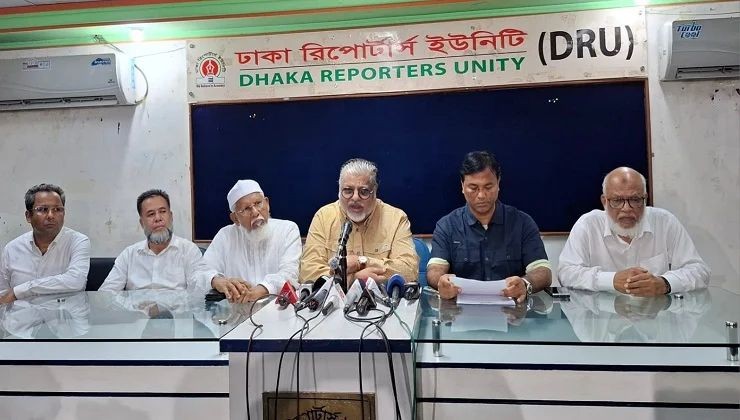A long-running conflict between two factions of the Bangladesh Association of International Recruiting Agencies (BAIRA) over control of the Malaysia-bound labour market turned violent on Monday, with one group allegedly attacking a rival’s press conference and leaving at least 10 people injured.
The clash occurred at the Sagar-Runi Auditorium of the Dhaka Reporters’ Unity (DRU), where a press conference led by BAIRA leader Fakhrul Islam was disrupted by members of the rival Sajjad Group. Police later intervened, and DRU leaders mediated to calm the situation.
Despite the scuffle, both factions went on to hold separate press briefings, reiterating their stances on the contentious issue of labour migration to Malaysia.
Fakhrul’s group accused former syndicate members—now part of the Sajjad Group—of trying to regain control over recruitment processes. He alleged that syndicate operations had previously doubled migration costs, with workers being forced to pay up to Tk 3 lakh during the 2020–2022 period.
To curb such exploitation, Fakhrul proposed a syndicate-free system using the Bureau of Manpower, Employment and Training (BMET) database. Under his plan, workers would register directly, and agencies would recruit from that pool. Payments would be made in three instalments via Probashi Kallyan Bank, reducing dependence on middlemen and cutting costs.
He claimed that Malaysian authorities also oppose syndicates but that certain vested groups in Bangladesh continue to push for their return, using influential names from previous governments.
Fakhrul cited political and business figures allegedly involved in past syndicate operations, insisting such arrangements cannot continue without state support.
Fakhrul also named former BAIRA leaders Ruhul Amin Swapon and Malaysian businessman Dato C Amin as masterminds behind a revived syndicate network, now operating through a system known as FWCMH.
He dismissed claims that this group had influence over prominent public figures, calling such suggestions baseless.
In response, the Sajjad Group held their own press conference. Member Atikur Rahman Atik denied involvement in the earlier violence and accused the Fakhrul faction of trying to sabotage Malaysia’s labour market under the guise of reform.
“They are promoting Indian interests and spreading misinformation,” he claimed.
Another BAIRA member, Mezbah Uddin Selim, alleged that the Fakhrul group was harming national interests by feeding negative reports to international media and encouraging legal action related to human trafficking and money laundering.
He warned that such activities are affecting Bangladesh’s international image, including its position in the US Trafficking in Persons report.
Selim further said while Malaysia is hiring from other countries, it remains hesitant to recruit from Bangladesh due to ongoing disputes.
“If this continues, Malaysia may opt for alternative labour sources. Bangladeshi workers could be forced into irregular migration, jeopardising legal channels altogether,” he warned.
He urged the government to support Malaysia’s current recruitment model and prioritise safe, low-cost migration, warning that internal sabotage could lead to a permanent loss of access to one of Bangladesh’s most promising labour markets.
Malaysia has long been a vital destination for Bangladeshi migrant workers. However, the market has been repeatedly disrupted by allegations of corruption, excessive recruitment costs, and monopolistic syndicate practices.
Although Malaysia has expressed interest in a more transparent system, internal divisions within BAIRA continue to hamper progress.


